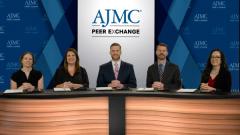
Key Takeaways Surrounding the Treatment of HIV
Panelists provide their closing thoughts on optimizing the management of HIV.
Episodes in this series

Adam C. Welch, PharmD, MBA: I want to thank all of you. This has been a rich and informative discussion. Before we conclude, I’d like to get some final thoughts from each of you. Shauna?
Shauna Applin, ARNP, CNM, AAHIVS: The take-home message I want everyone to walk away with is that the only end goal we have is for the patient, and we’ve got to do it through collaboration. Christian used the word silos. We’ve got to pull apart those silos and work together, including the communities affected and the patients, but also other individuals who care about the end goal and the outcomes. That collaboration is critical.
Adam C. Welch, PharmD, MBA: Ann?
Ann Khalsa, MD, MSEd, FAAFP, AAHIVS: I agree. We have to realize we’re treating fellow humans. [We have to] do for our patients or the community what we would want if the individuals affected were our family members and loved ones. When I’m teaching about HIV, the message I always reinforce is that it’s completely preventable and 99% effective. We don’t have much in medicine that’s that effective. It’s also completely treatable. No one has to die of AIDS. Forty years into this epidemic of HIV, seeing patients die of advanced AIDS is needless. We don’t need to be there. We still have unmet needs, and we have to collaborate, treat the whole person, and solve this puzzle.
Adam C. Welch, PharmD, MBA: Christian?
Christian B. Ramers, MD, MPH, FIDSA, AAHIVS: I mentioned the knowledge implementation gap. We have very good tools, which are 99% effective at prevention. Our good HIV regimens can get over 90% of patients suppressed. We have very good best practices. We have examples in the Ryan White [HIV/AIDS] Program of how to get there. We just need to do it. A lot of what we’re frustrated by is that we have great tools and know how to use them, yet we still see patients dying of AIDS. We still see new infections—30,000 of them every year.
One aspect I don’t think we’ve talked a lot about is that we also need providers. We need a new generation of HIV providers. A lot of the first-generation providers who did their residency at San Francisco General [Hospital] in the 1980s and were pulled into this whole thing are retiring. We need very strong HIV programs based out of primary care. If we do all those things, these are achievable goals. Countries much less wealthy than [the United States] are doing it, and they’re reaching that 95-95-95 goal. We can definitely do it if we work together.
Adam C. Welch, PharmD, MBA: Alina?
Alina Orozco, RN: I’ll echo what everyone on the panel has said: collaboration is key. Also, Christian’s point about health care providers coming into the space is critical. The health care providers I started doing this work with almost 35 years ago are still there, and they’re retiring. We need to bring in providers, especially those who look like our members. That helps create that rapport. One thing that’s [important] about HIV is that patients have long-standing relationships with their providers. That’s key. Sometimes our work is getting that member to the right provider so they click. It makes all the difference in the world. That’s also critical.
Adam C. Welch, PharmD, MBA: There’s a reason why the adherence threshold is higher for HIV treatment than it is for other chronic medical diseases. There’s a reason why we stratify our patients into treatment experience vs treatment-naïve, and why we give so many genetic and drug-resistant tests to these patients to optimize their therapy. HIV isn’t treated the same way we treat other chronic medical diseases, so from a payment standpoint, it shouldn’t be treated like any other chronic medical disease. As you’ve heard, it requires a lot of focused attention, a lot of holistic attention on the patient to achieve those optimal outcomes that we all desire. We have the same goal. We need to work together and communicate effectively to reach those goals.
Thank you again. To our viewing audience, we hope you found this AJMC® Peer Exchange to be useful and informative. Thanks.
Transcript edited for clarity.
Newsletter
Stay ahead of policy, cost, and value—subscribe to AJMC for expert insights at the intersection of clinical care and health economics.









